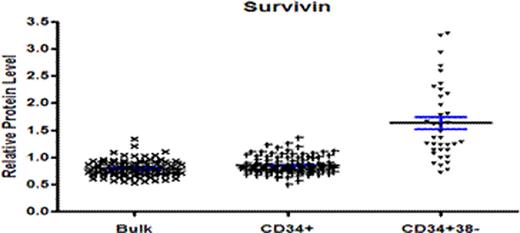Abstract
Abstract 238
Survivin, a member of the inhibitor of apoptosis (IAP) protein family, plays important roles in cell proliferation and survival and is highly expressed in various malignant cells, including leukemic cells. We showed previously that targeting survivin expression in AML cells induces a cell proliferation defect and subsequent cell death involving the mitochondrial pathway. To assess its usefulness as a prognostic marker in AML, we profiled survivin expression in samples from 511 newly diagnosed AML patients using a validated reverse-phase protein array and correlated its protein expression levels with clinical outcomes. We found that survivin levels were higher in the bone marrow (BM) than in peripheral blood (PB) leukemic cells in 140-paired samples (p = 0.0001) consistent with its function in cell proliferation. Survivin levels did not correlate with cytogenetic groups, the mutational status of nucleophosmin or FLT-3, BM or PB blast counts, white blood count, or patient performance status. Interestingly, survivin levels were found to significantly predict shorter overall (P = 0.016) and event-free (P = 0.023) survival in multivariate Cox model analysis. Age, gender, white blast count, BM blasts, cytogenetics, and survivin levels were included in the final model. The groups expressing low and high survivin were defined by the median value. This was also true when data sets from BM and PB were analyzed separately. Further, we found that survivin levels were significantly higher in CD34+38− AML stem/progenitor cells than in bulk AML blasts and total CD34+ cells (2.06 and 1.91 fold, respectively, P < 0.001) when we analyzed survivin expression in 37 samples of isolated CD34+38− AML cells (see Figure).
These results suggest that survivin expression levels are prognostic in AML and that survivin is overexpressed in AML stem/progenitor cells, may play an important role in AML stem cells, and may thus be an important target in AML therapy.
Disclosures:
No relevant conflicts of interest to declare.
Author notes
*
Asterisk with author names denotes non-ASH members.
© 2011 by The American Society of Hematology
2011


